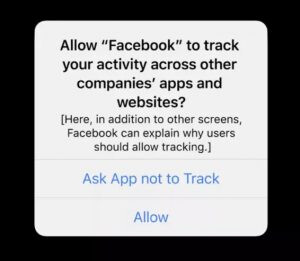10 - 06 - 2022
iOS Data Tracking

Apple knows how to distinguish itself from other big companies
With iOS 14, Apple is once again proving itself capable of changing the market and the rules that govern it: in this case, we are talking about the consequences of 'App Tracking Transparency (ATT)'.
After the system update (iOS 14.5), every app launched for the first time on a mobile device will present a window allowing the user to enable or disable data tracking for advertising purposes. The message will be clear, 'invasive' and will prompt the device owner to make the choice immediately. There will probably not be much doubt about the final decision Apple device owners will make.

How is this data used?
This data has always been used by large advertising platforms to target specific advertisements to the advertiser's target audience, increasing conversions and return on investment.
Age, gender, profession are some of the classic demographic data to be extrapolated from apps and social, but the information that can be gathered with tracking can go much further; by identifying passions, interests and habits we can create a clearer picture of our user. For example, knowing that the best-selling product within one's E-commerce was purchased several times by "Women between the ages of 18-24 who are passionate about CrossFit", allows the advertiser to create a purpose-built ad that will only be viewed by the chosen segment, greatly optimising the ROAS (return on advertising investment).
But what may be the consequences of this update?
Consequences for users
For users there will be no major changes, at most they will notice banners that are inappropriate and not relevant to their interests.
Consequences for advertisers
Facebook itself estimates that there will be a 60 per cent decrease in the return on investment, and points out that it is small and medium-sized enterprises that will suffer most.
In practice, without going into technicalities, campaigns will be more difficult to optimise as there will be less data to analyse and, as written above, personalised audiences (containing users with profiled behaviour and interests) will be less populated. Indeed, it is estimated that around 50 per cent of Facebook mobile users are from Apple devices.
The race to the rescue
Mark Zuckerberg's giant did not only oppose with statements and official announcements, the countermeasures are also of a technical nature. With the help of various official guides and internal Business Manager support, Facebook is helping advertisers to adapt to the coming changes.
"The 'event aggregator' will allow conversions to be measured (no more than 8), within the limits imposed by iOS, and the attribution window will be reduced to a maximum of 7 days. Finally, checking the domain and setting conversions at the server level will be an essential step for the developer to manage.
But will these countermeasures be enough? How will digital advertising evolve over the coming months?

And Google?
With Android 12 approaching, there are already rumours about how Google too will adapt to the privacy trend set by the Cupertino company. Google's approach, however, will be more subtle: no window will appear when a new application is launched; machine learning will take care of everything, filtering the ads it deems most appropriate, and all this will be done by creating a local user profile that will replace third-party cookies. A solution that should allow the user to receive ads in line with his or her interests, avoiding them from being redundant and oppressive.
Could this be a solution that will bring together the digital marketplace and the app and social user?
Professionals and brands that populate the world of the web will have to wait several months with bated breath before they can analyse the first data and understand the evolution of the digital market, but there is no doubt that there will be consequences in the short and long term.
And what about you, are you already adapting to the changes?
- Strategy
- Branding
- Digital
- Content
View Project

